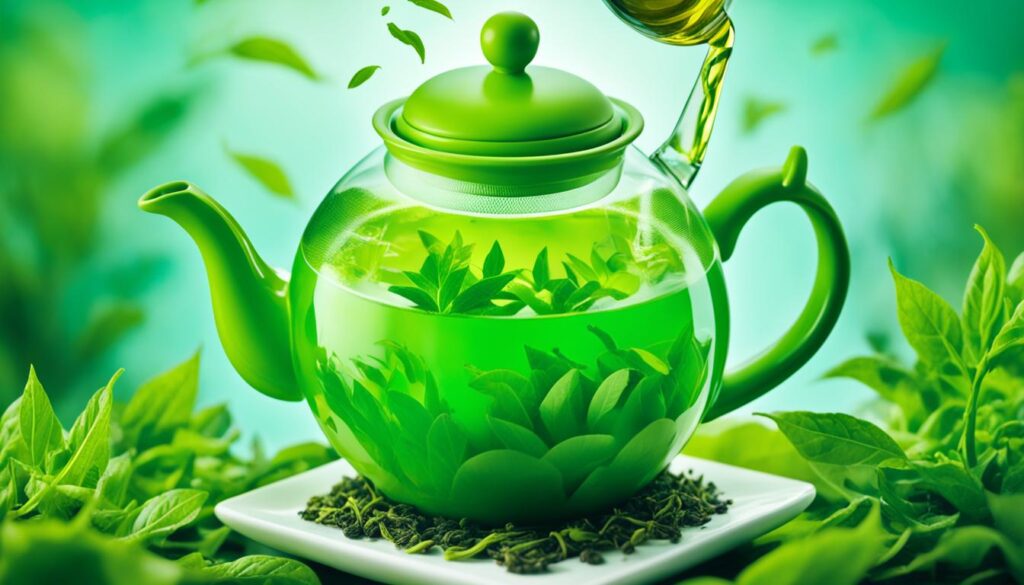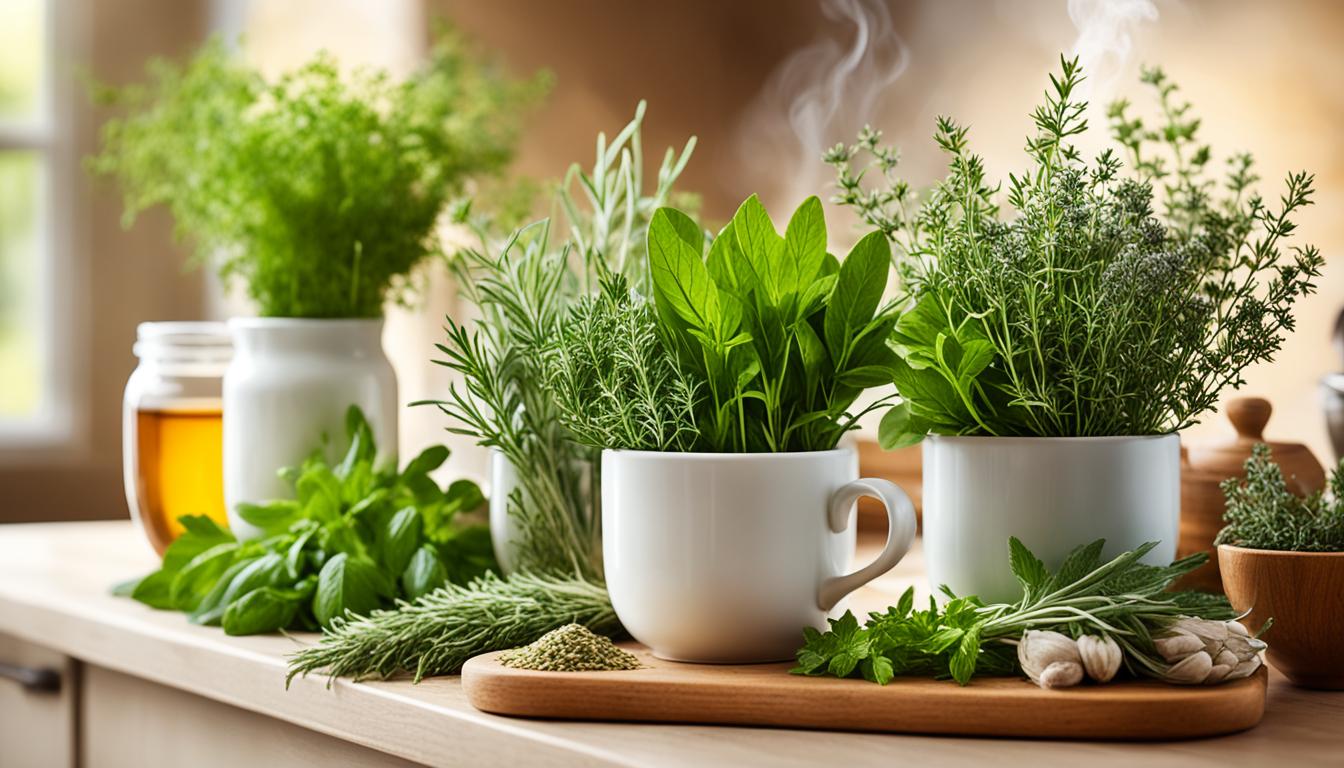In the serene realm of natural remedies for digestive health, the understated power of herbal teas for gut health emerges as a beacon of relief and balance. These time-honored elixirs, steeped in both tradition and therapeutic compounds, are unlocking the secrets to digestive wellness through every soothing sip. Embrace the harmony of nature’s remedies and discover a path to digestive tranquility that aligns with the gentle rhythms of your body.
Partaking in the ritual of herbal tea consumption is an invitation to an ancestral practice that intuitively understood the correlation between natural plant properties and the healing of the human body. Modern science has begun to weave this ancient knowledge with contemporary research, reaffirming the potent role these botanical brews play in nurturing gut health and fostering an overall sense of wellbeing.
Key Takeaways
- Herbal teas offer a harmonious approach to managing digestive health.
- Natural compounds in herbal teas are effective in soothing common digestive issues.
- Incorporating herbal teas into one’s diet may lead to improved digestive wellness.
- Scientific research supports the medicinal properties of various herbal teas.
- Cultural and historical traditions have long revered the benefits of herbal teas for gut health.
- The regular inclusion of herbal teas can contribute positively to overall health and wellbeing.
Discover the Best Herbal Teas for Gut Health
Embarking on a journey to enhance gut health naturally leads us to the aromatic world of herbal teas. With their diverse range of flavors and therapeutic compounds, these herbal infusions offer more than just a delightful taste experience—they are potent allies in the quest for digestive wellness. Below, we delve into the top herbal teas known for their gut-healing virtues, each with its unique profile of benefits.

Peppermint Tea: A Cooling Relief
Peppermint Tea has long been revered for its refreshing essence and remarkable ability to provide cooling relief to an upset digestive system. Famous for its effectiveness against symptoms like abdominal discomfort, bloating, and indigestion, Peppermint Tea stands out as a natural digestive aid. Let’s unravel the soothing effects of this minty brew and understand how it can lessen the distress of those managing IBS and other gastrointestinal conditions.
Ginger Tea: Spicy and Soothing
Warming and zesty, Ginger Tea is much more than a flavorful drink—it’s a potent elixir with anti-inflammatory properties. Well-known for its capability to curb nausea and promote smooth digestion, this spicy tonic is rooted in age-old traditions. The power of gingerol, the active ingredient in Ginger Tea, is at the heart of its health benefits. Discover who could gain the most from integrating this herbal tea into their dietary routine, particularly when navigating through digestive turmoil.
Chamomile Tea: Gentle and Calming
As the embodiment of tranquility, Chamomile Tea is not just for improving sleep—it’s a gentle digestive tea that offers considerable stress-relief. It’s adept at mollifying upset stomachs, easing indigestion, and acting as a natural antispasmodic. Through its mild nature, Chamomile Tea can be seamlessly woven into nightly habits to soothe both the mind and the digestive tract. Explore how its calming charm can be part of your holistic path to gut health.
Antioxidants in Green Tea: Health Impacts
Delving into the realm of antioxidant-rich beverages, green tea emerges as a powerhouse with unmatched properties that oil the gears of health and well-being. When exploring the health benefits of green tea, one cannot overlook the robust infusion of polyphenols and catechins—compound allies in your personal health army, waging war against cellular assailants.

Green Tea Benefits: Beyond Digestion
Green tea benefits extend well beyond the soothing sanctuary of digestive health. Its polyphenols, including a wealth of green tea catechins, marshal a defense against chronic conditions, fortifying cardiovascular fortresses and trimming the sails on the ship navigating toward weight management. The cognitive realm too reaps rewards from this verdant elixir; each sip may carry the echoes of enhanced brain function.
Green Tea Antioxidant Properties Exposed
In the laboratory of nature, green tea polyphenols reveal a treasure trove of antioxidant activity. Primarily, epigallocatechin gallate (EGCG) stands out as the herald of this oxidative stress reduction, grappling with free radicals that threaten cellular peace. Scientific evidence verifies the contribution of these antioxidants to the composite health shield that green tea provides its consumers.
Addressing Green Tea and Oxidative Stress
Oxidative stress, the specter looming over the well-being of our cells, has met its match in the polyphenols in green tea. Chronicled evidence speaks of these natural constituents’ proficiency in quelling the fires of cellular distress. Let it be known that the link between sipping this ancient brew and the plummeting markers of oxidative stress is no myth but a chronicled reality in human health annals.
| Health Benefit | Role of Green Tea Polyphenols | Impact on Oxidative Stress |
|---|---|---|
| Weight Management | Increases metabolism and fat oxidation | Reduces stress induced by adipose tissue |
| Cardiovascular Health | Improves cholesterol levels | Protects against arteriosclerosis |
| Cognitive Function | Enhances cognitive performance | Protects neurons from oxidative damage |
| Longevity | Promotes healthy cell function | Minimizes age-related oxidative effects |
Conclusion
Throughout this dialogue on herbal teas for digestive wellness, we have traveled from the raw, potent flavors of peppermint to the verdant embrace of green tea, unveiling their remarkable capabilities as both a delicacy and a remedy. The fabric of traditional medicine is interwoven with these natural elixirs, now increasingly upheld by rigorous scientific research. They exemplify how nature’s bounty can work in concert with scientific understanding to empower individuals in their pursuit of natural remedies for a happier gut.
The impact of green tea on health extends a mosaic of benefits, from its digestion-friendly attributes to its mighty antioxidant prowess. As we have seen, each sip carries a spectrum of polyphenols that guard against oxidative stress, resonate with our vital organs, and encourage a state of harmonious health. The implications of these findings are profound, standing as a testament to the green tea health impacts that resonate well beyond the confines of digestive wellness.
In conclusion, as modern lifestyles perpetually seek balance, the wisdom of herbal teas emerges as a guiding light. Embracing these beverages for their therapeutic properties can open a path to enhanced well-being. Let us celebrate the synergy between culture, science, and nature as we integrate these ancient, yet ever relevant, herbal teas into our daily rituals for a life more vibrant and a gut undeniably happier.
FAQ
What are the digestive wellness benefits of herbal teas?
Herbal teas have been widely recognized for their ability to promote digestive wellness. Incorporating teas like peppermint, ginger, and chamomile into your diet can soothe the gut, ease indigestion, alleviate symptoms of IBS, and reduce inflammation in the digestive system.
How does peppermint tea provide cooling relief for the gut?
Peppermint tea contains natural compounds that relax the muscles in your digestive tract, which can alleviate abdominal discomfort, bloating, and indigestion. Its cooling effect is a therapeutic remedy that provides soothing relief, particularly for those suffering from IBS.
Can drinking ginger tea improve digestive health?
Yes, ginger tea is a powerful ally for digestive health due to its strong anti-inflammatory properties and compounds such as gingerol. The tea can help manage nausea and promote smooth digestion, making it beneficial for those with digestive concerns.
What makes chamomile tea a good choice for digestive health?
Chamomile tea boasts natural antispasmodic effects that can help to relax the digestive system and alleviate discomfort. Its gentle calming properties can also soothe the stomach and aid in relieving symptoms of indigestion while helping to improve sleep quality.
What are the broader health benefits of green tea beyond digestion?
Green tea is celebrated for a multitude of health benefits, including its contribution to weight management, improved heart health, and enhanced cognitive functions. The high content of polyphenols and catechins like EGCG in green tea plays a significant role in these health-boosting effects.
How do the antioxidant properties of green tea support overall health?
The catechins found in green tea, particularly epigallocatechin gallate (EGCG), have potent antioxidant properties that help combat oxidative stress by neutralizing free radicals. This defense mechanism contributes to the protective health effects of green tea, safeguarding against cellular damage and chronic diseases.
How does green tea aid in reducing oxidative stress in the body?
The polyphenols in green tea can significantly mitigate oxidative stress, which is linked to chronic diseases. By enhancing cellular protection and promoting longevity, green tea consumption has been associated with reduced markers of oxidative stress, making it a formidable ally in maintaining health and wellbeing.
Can herbal teas be considered part of a holistic approach to health?
Absolutely. The use of herbal teas is rooted not just in traditional medicine but also in modern science. As the knowledge about the health impacts of herbal teas, such as their antioxidant properties and digestive benefits, becomes more prevalent, they increasingly play a key role in holistic health practices.



